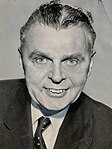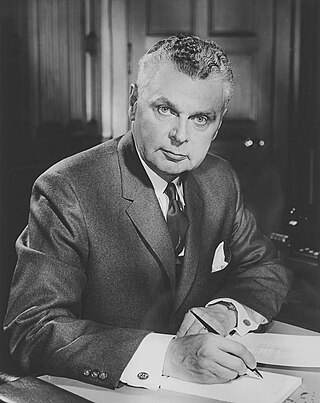
John George Diefenbaker was the 13th prime minister of Canada, serving from 1957 to 1963. He was the only Progressive Conservative party leader between 1930 and 1979 to lead the party to an election victory, doing so three times, although only once with a majority of the seats in the House of Commons.

The Progressive Conservative Party of Canada was a centre to centre-right federal political party in Canada that existed from 1942 to 2003.
The Progressive Party of Canada, formally the National Progressive Party, was a federal-level political party in Canada in the 1920s until 1930. It was linked with the provincial United Farmers parties in several provinces, and it spawned the Progressive Party of Saskatchewan, and the Progressive Party of Manitoba, which formed the government of that province. The Progressive Party was part of the farmers' political movement that included federal and provincial Progressive and United Farmers' parties.

The leader of the Official Opposition, formally known as the leader of His Majesty's Loyal Opposition, is the politician who leads the Official Opposition in Canada, typically the leader of the party possessing the most seats in the House of Commons that is not the governing party or part of the governing coalition.

The Conservative Party of Canada has gone by a variety of names over the years since Canadian Confederation. Initially known as the "Liberal-Conservative Party", it dropped "Liberal" from its name in 1873, although many of its candidates continued to use this name.

John Bracken was a Canadian agronomist and politician who was the 11th and longest-serving premier of Manitoba (1922–1943) and later the leader of the Progressive Conservative Party of Canada (1942–1948).
The first Progressive Conservative Party of Canada leadership election was held in 1927, when the party was called the Conservative Party. Prior to then the party's leader was chosen by the caucus or in several cases by the Governor General of Canada designating a Conservative MP or Senator to form a government after the retirement or death of an incumbent Conservative Prime Minister.
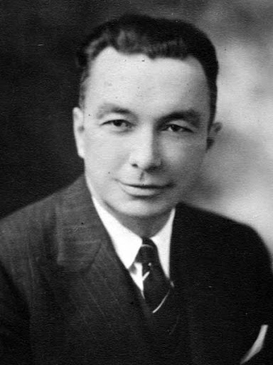
Errick French Willis was a politician in Manitoba, Canada. He served as leader of the province's Conservative Party between 1936 and 1954, and was responsible for beginning and ending the party's alliance with the Liberal-Progressive Party. He also served as Manitoba's 15th Lieutenant Governor between 1960 and 1965.
The 1932 Manitoba general election was held on June 16, 1932 to elect Members of the Legislative Assembly of the Province of Manitoba, Canada. A Liberal-Progressive majority government was elected.
Ewan Alexander McPherson was a politician in Manitoba, Canada. He served in the House of Commons of Canada from 1926 to 1930. He was also a member of the Legislative Assembly of Manitoba from 1914 to 1920 and from 1932 to 1936, and served as a cabinet minister in the government of John Bracken.

Arthur Meighen was a Canadian lawyer and politician who served as the ninth prime minister of Canada from 1920 to 1921 and from June to September 1926. He led the Conservative Party from 1920 to 1926 and from 1941 to 1942.
The Port Hope Conference was a meeting of the Conservative Party of Canada at Port Hope, Canada in 1942 to develop a new party platform.
Wilfrid Garfield Case also known as W. Garfield Case,, was a Canadian politician who served as a Progressive Conservative Member of Parliament and Mayor of Owen Sound, Ontario. He is best known for his upset victory over Defence Minister General Andrew McNaughton in the Grey North federal by-election held on February 5, 1945.
In Canadian politics, a leadership review is a vote held at a political party convention in which delegates decide whether to endorse the incumbent party leader or schedule a leadership convention to elect a new leader. In most parties at present, such a vote is required at the first convention following a general election. While a leadership election is only required if the incumbent leader fails to receive support from a simple majority of delegates, in practice leaders who do not win the review by a substantial margin are expected to either call a leadership election and re-offer or resign altogether. The term also refers to reviews under the Reform Act, in which the party caucuses in the House of Commons decide on whether to retain the leader.

The 1956 Progressive Conservative leadership election was held to choose a leader for the Progressive Conservative Party of Canada. The convention was held at the Ottawa Coliseum in Ottawa, Ontario, Canada. The convention began on December 13, 1956 with voting occurring on December 14 when John Diefenbaker was elected the new leader.
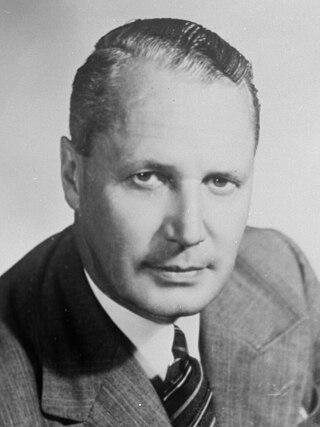
The 1948 Progressive Conservative leadership election was held to choose a leader for the Progressive Conservative Party of Canada. The convention was held at the Ottawa Coliseum in Ottawa, Ontario, Canada. Voting occurred on October 2, 1948. Premier of Ontario George A. Drew was elected as the party's new leader. The National Film Board of Canada made a short film about the event for its Eye Witness series.
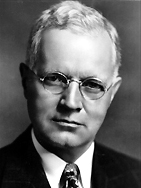
A National Conservative leadership convention began on July 5, 1938, culminating in a leadership ballot on July 7. The Conservative Party of Canada chose Robert James Manion to succeed former Prime Minister R. B. Bennett as party leader.
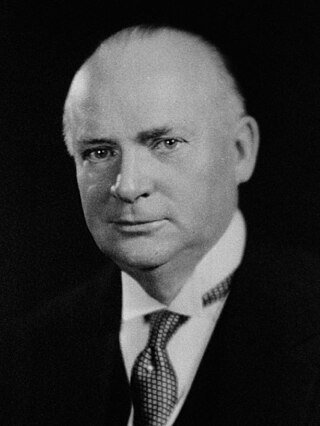
A Conservative leadership convention was held on October 12, 1927 at the Winnipeg Amphitheatre in Winnipeg, Manitoba. The convention was held to choose a new leader of the Conservative Party to choose a successor to former Prime Minister of Canada Arthur Meighen who had led the party since 1920. This was the first time the Conservatives used a leadership convention to choose a leader. Previous leaders had been chosen by the party's caucus, the previous leader, or by the Governor General of Canada designating an individual to form a government after his predecessor's death or resignation.

This article is the electoral history of William Lyon Mackenzie King, the tenth Prime Minister of Canada. A Liberal, he was Canada's longest-serving prime minister, with three separate terms as prime minister, for a total of 21 years and 154 days. He defeated Prime Ministers Arthur Meighen and R.B. Bennett at different times, and was succeeded by Prime Minister Louis St. Laurent in 1948.

This article is the Electoral history of John Diefenbaker, the thirteenth Prime Minister of Canada.


